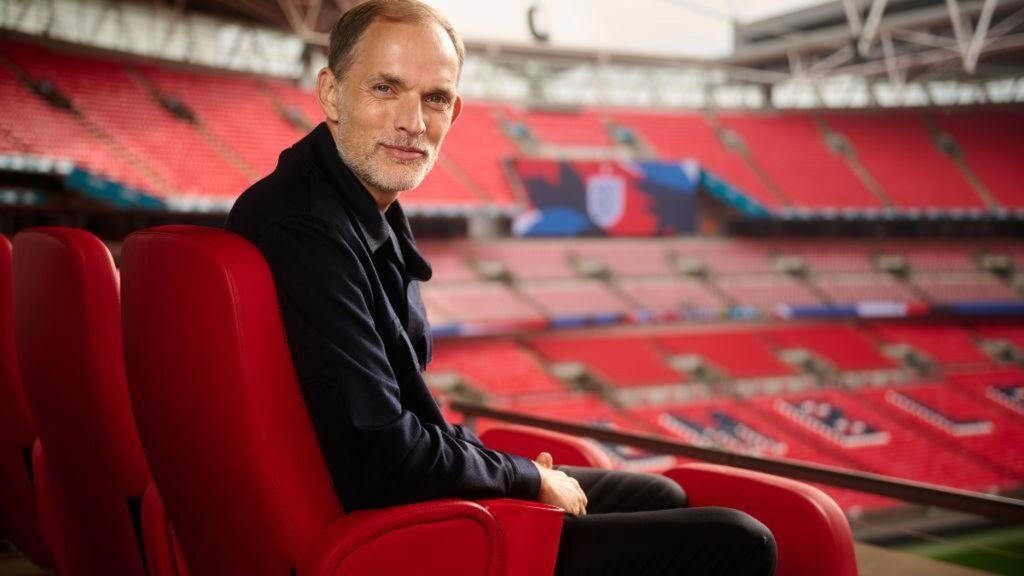After eight long years, two Euro finals and a World Cup semifinal in 2018, Gareth Southgate decided to call it a day on his spell as the manager of England’s men national team. Seeing over a very successful change of not only a generation of players but, to a certain extent, the footballing philosophy as well, Southgate’s era certainly marked a before and an after in Three Lions‘ history.
However, amidst a lot of pressure and criticism due to unconvincing performances at the Euros and an approach many deemed too conservative, Southgate decided to resign following another bitter defeat in a major tournament final.
Lee Carsley, manager of the U21 team stepped in as a temporary solution, kicking off the campaign in Nations League while The FA searched for a new manager.
The third foreigner in charge
This week, the search has come to an end. The FA have announced that, starting from 2025, Thomas Tuchel will be the new England boss.
Such a decision stirred a lot of controversy and criticism in a part of the English public, amongst journalist, pundits and fans alike. The main reason – the fact that for only the third time in the FA’s 160 years of history a foreigner will be leading the men’s national team.
Curiously, the remaining two foreigners were both in charge during the 21st century, the Swedish legend Sven-Göran Eriksson and the Italian tactical mastermind Fabio Capello. So, let’s take a quick look at their careers and see how they did while managing England.
Eriksson joined the Three Lions after a career that spanned for over 25 years, managing and winning league titles in Sweden, Portugal and Italy. His stint with Lazio where he won 7 trophies was what brought him to the spotlight and landed him the England job, making him the first stranger ever to take charge. A stint full of highs and lows, it saw Eriksson qualify England for two World Cups and the 2004 European Championship in Portugal.
In 2002 England ended second in their group with Nigeria, Argentina and Sweden, beat Denmark 3-0 in the Round of 16 before falling short against Brazil (1-2), the eventual winners of the tournament.
At the Euros in 2004 they lost to France after a stoppage-time comeback inspired by Zinedine Zidane but beat both Switzerland and Croatia to make it out of the group stage on top. However, the penalties went against them when they faced the hosts Portugal in the quarterfinals.
In January 2006, following a controversial conversation with a journalist disguised as a Saudi businessman interested in opening a sports academy in which Eriksson asked him to buy Aston Villa, stating that he’d be leaving England after the World Cup and would take over at Villa Park, the FA announced that he would indeed be leaving the national team once the World Cup ends.
In the tournament, England beat Paraguay and Trinidad & Tobago and drew with Sweden to progress to the last 16 where they beat Ecuador thanks to a David Beckham free kick. However, history proceeded to repeat itself after Portugal once again got the best of England after penalties.
Overseeing a change of a generation and nurturing upcoming players like Rio Ferdinand, John Terry, Frank Lampard, Steven Gerrard etc., the sensation was that England should have gotten more out of such a talented generation and, generally, the public was far from impressed by Eriksson’s stint in charge.
After briefly returning to domestic resources with Steve McLaren (who failed to qualify for the 2008 Euro), the FA looked abroad for their new manager. This time, the man chosen for the job was Fabio Capello.
Capello enjoyed great success early in his career, winning four Serie A titles and a Champions League with Milan in the early 90s. A brief stint with Real Madrid saw him win LaLiga and in his return to Italy he won league titles with both Roma and Juventus. To top it off, he returned to Real Madrid and won another league title before joining England.
He hit the ground running, winning 9 out of their 10 World Cup Qualifiers and finishing it as the team with most goals scored across the European qualifiers. The tournament itself, however, was underwhelming. They made it past the group stage, but only 5 points form a relatively weak group featuring USA, Algeria and Slovenia were far from convincing. They paid the price in the very next game, falling 4-1 to Joachim Löw’s Germany.
Euro 2012 qualifiers were once again successful, albeit more turbulent, but after constant tension in his relationship with The FA, Capello resigned before the tournament itself, in February 2012, after The FA’s decision to strip John Terry off of England’s captaincy. So, another foreigner left England with results that were far from impressive.
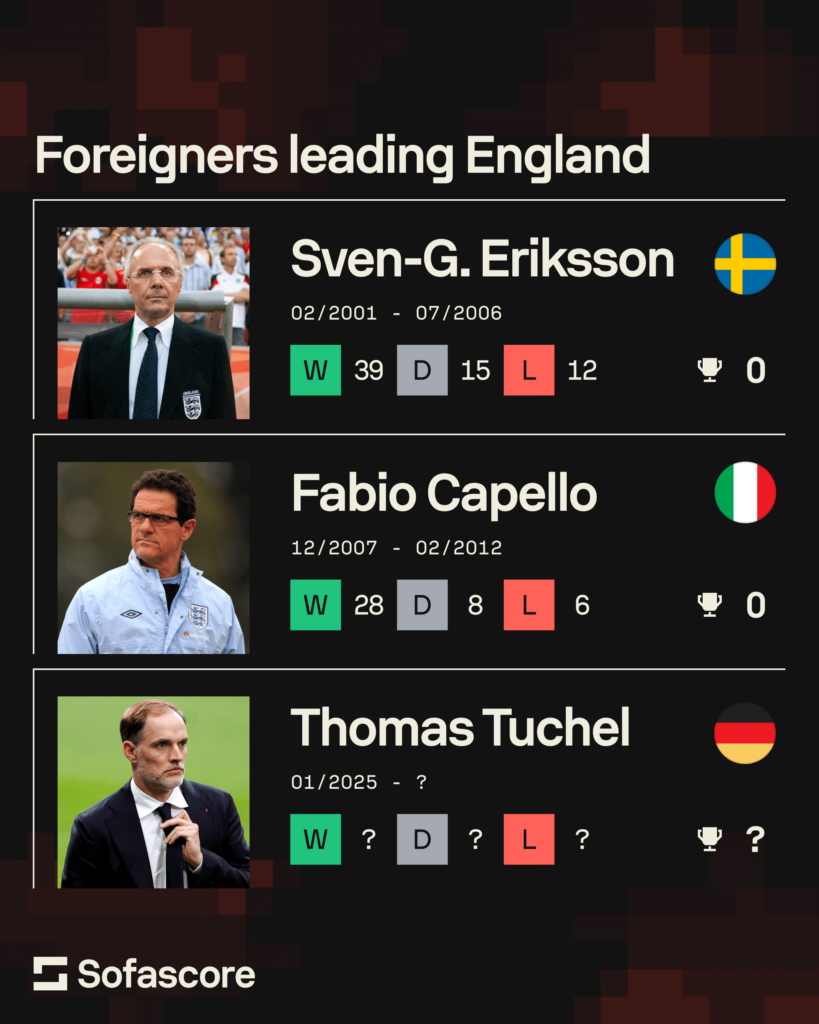
How does Tuchel fare?
Looking at his managerial path, Tuchel compares nicely to both Eriksson and Capello. Although he might lack the amount of silverware won by the two, he has priceless experience of working with England thanks to his spell at Chelsea. After leaving Mainz, he’s won a trophy in every top-level club he worked at, including league titles with PSG and Bayern and a Champions League with Chelsea.
As it was the case with England’s previous two foreign managers, this will be his first time in charge of a national team. The challenges of international management compared with a day-to-day job in a club surrounding are various, and the adaptation process is not always seamless. However, with the incredible pool of talent at his disposal, it shouldn’t be long before we get to see the first outlines of Tuchel’s work with England’s finest.
Tactically, Tuchel has always preferred a proactive, possession-based approach to football and in that sense the players won’t be in for a shock when they first come together under the former Chelsea boss. Additionally, England played a lot of their football under Gareth Southgate in systems that featured a back three, something that Tuchel has also relied heavily on in his career and used such systems in PSG and Chelsea. With a lot of players to choose from, and many of them very well adapted to playing in a back three, we should expect Tuchel to opt for that solution with England as well.
If we look at how Tuchel performed in his clubs, we could extract a pattern that suggests that his tactics, match preparation and the ability to adapt from one opponent to another are well suited for tournaments, which could be a huge asset for England when the World Cup and Euros come around the corner.
In the 2020-21 season the team struggled to find consistency in the Premier League and, despite finishing fourth, only amassed 67 points (which wouldn’t have been enough to make the Top 4 in none of the three seasons played since) winning exactly half of their games, drawing 10 and losing 9. In the Champions League, however, they only lost to Porto in the return leg of the quarterfinal after beating them away in the first leg. They topped their group and beat Atlético Madrid, Porto and Real Madrid in the knockout stage before taking care of Manchester City in the final.
That occasion was his second time in a Champions League final, after playing one with PSG the season before, losing out to Bayern Munich. It was exactly in Munich where he showed his capacity in knockout tournaments once again, despite a difficult situation in the Bundesliga that saw them finish third, they were undefeated in the group stage before knocking out Lazio and Arsenal and leading against Real Madrid at the Santiago Bernabéu before falling victim to a very late comeback by the eventual winners of the competition.
England with Tuchel – Potential Lineups
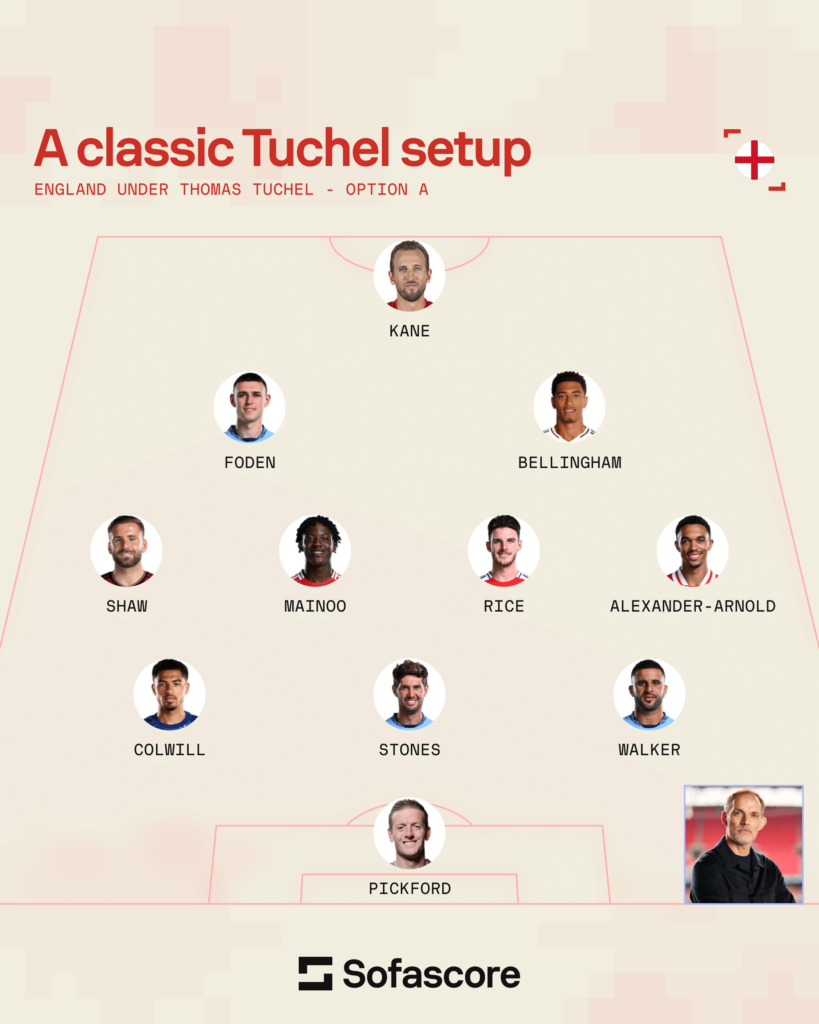
Our first option could see Tuchel opt for a system he used at Chelsea, and to some extent during his time with Paris Saint-Germain.
Given the characteristics of the players at his disposal an their suitability to play in such systems, a three at the back could be the go to for Tuchel.
With the wing-backs providing the width, this setup does not feature traditional wingers, rather two offensive midfielders behind the striker. With Harry Kane more than capable of dropping deeper to receive the ball and spread the play, it could also open up the space for Jude Bellingham‘s runs into the box which saw him score so many goals for Real Madrid last season.
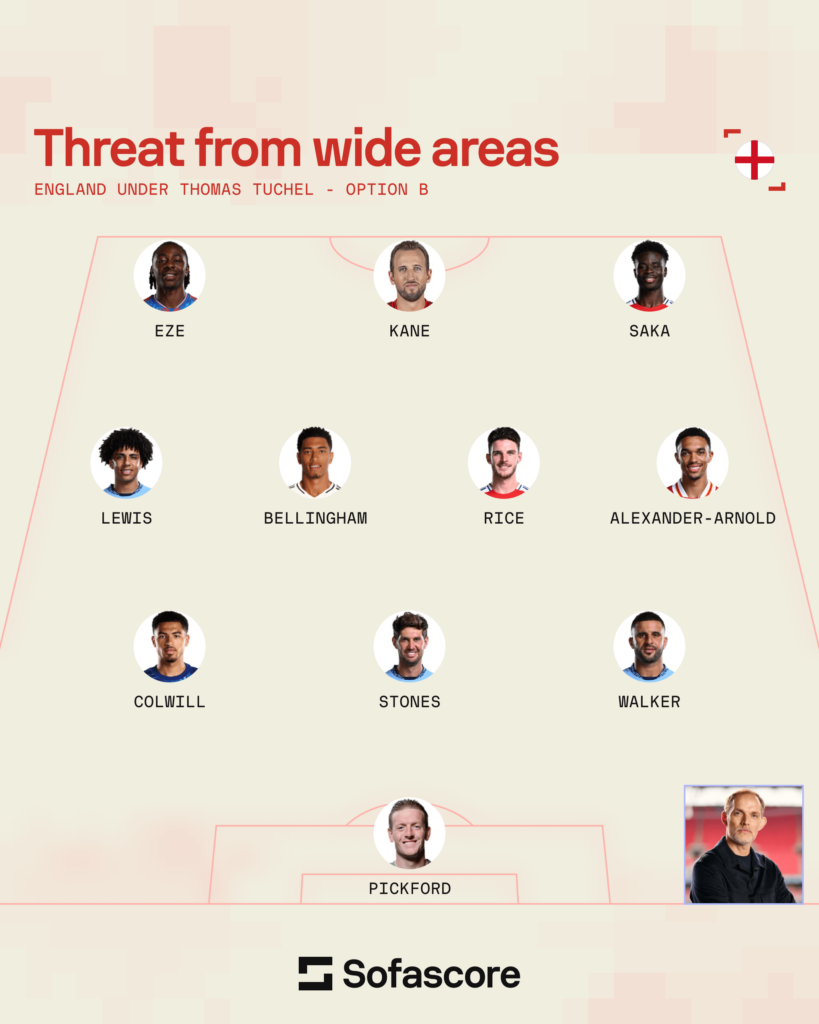
Another setup with three central defenders, this time with the emphasis on exploiting wide zones of the pitch thanks to excellent dribblers on each of the wings. Rico Lewis and TAA would provide the extra width and the overlap runs, while Kane would take on a more traditional, stationary role in the box.
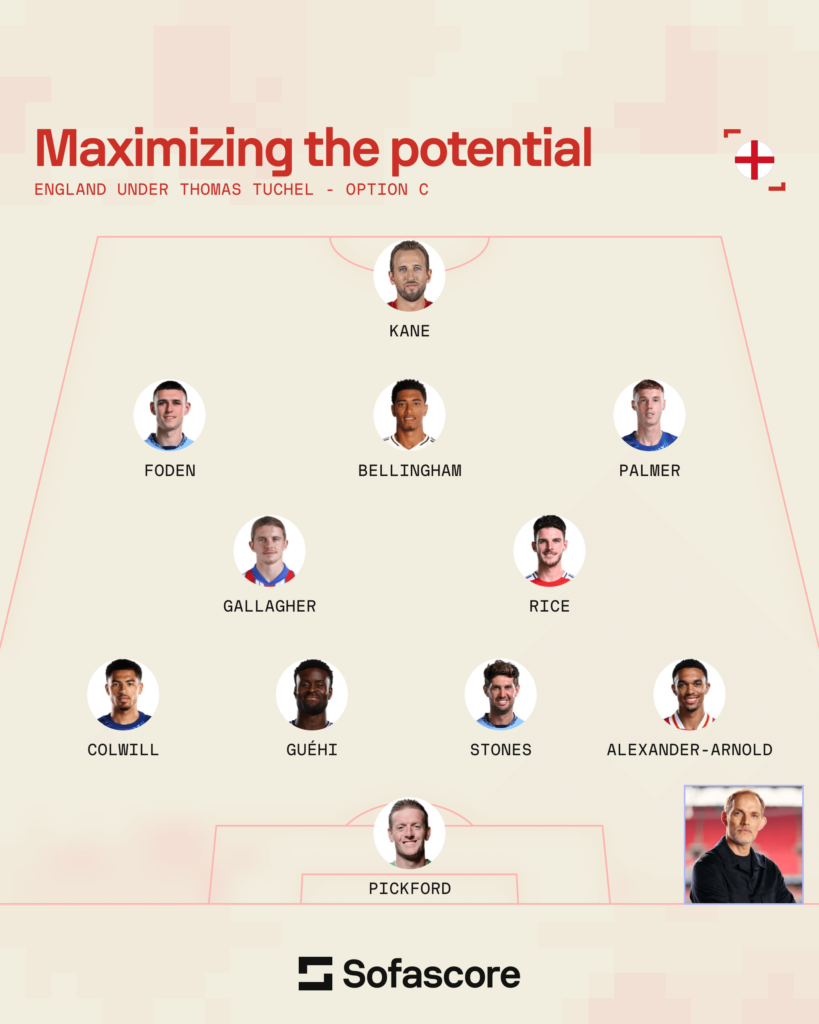
A formation that Tuchel relied on during the earlier days of his career, especially in Dortmund, the 4-2-3-1 brings the all important balance to this England side and could be the go to for matches against the top-level opposition and in games where there’s a lot at stake. The front four + TAA makes this a very dangerous lineup with a variety of different solutions and ways to hurt the opposition, while remaining balanced with a double-pivot midfield.
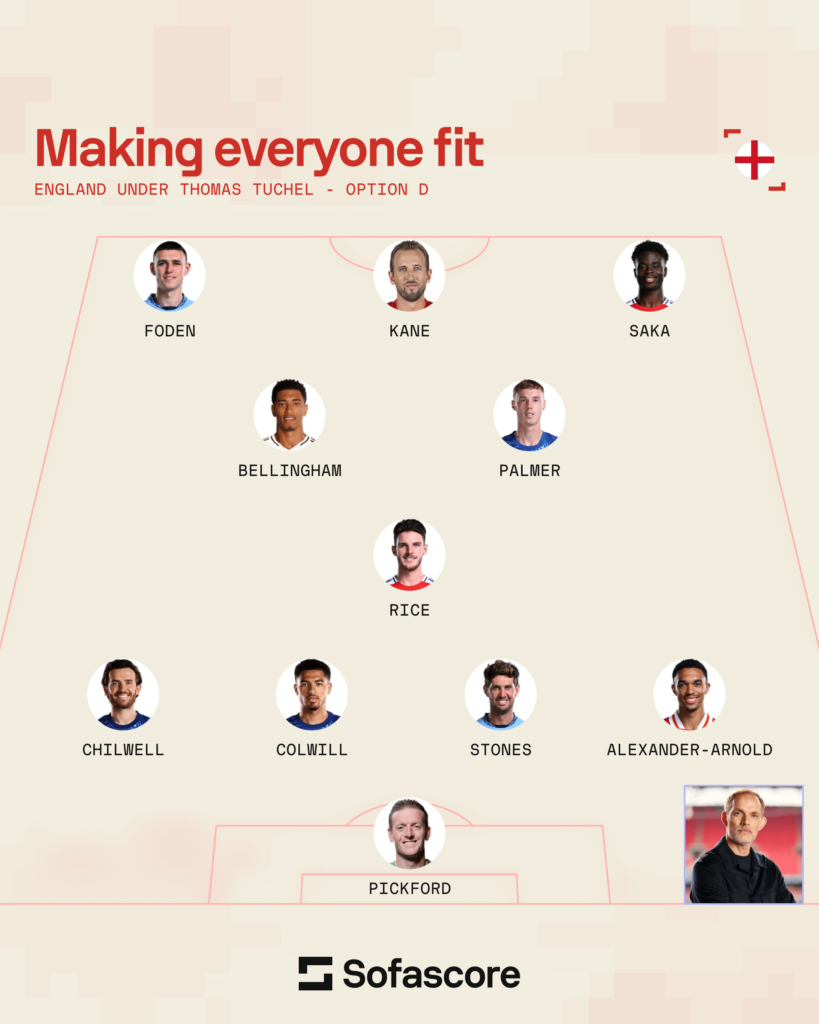
Similar to the previous option, a more traditional 4-3-3 setup could see Tuchel try and fit the most of his best players in the lineup. It’s a tough ask when you have as much good players as England does, but this combination might work wonders. Especially on the right-side where the Palmer/Saka combination could do wonders if the midfielder links with the Arsenal winger as well as he does with his Chelsea teammate Noni Madueke.
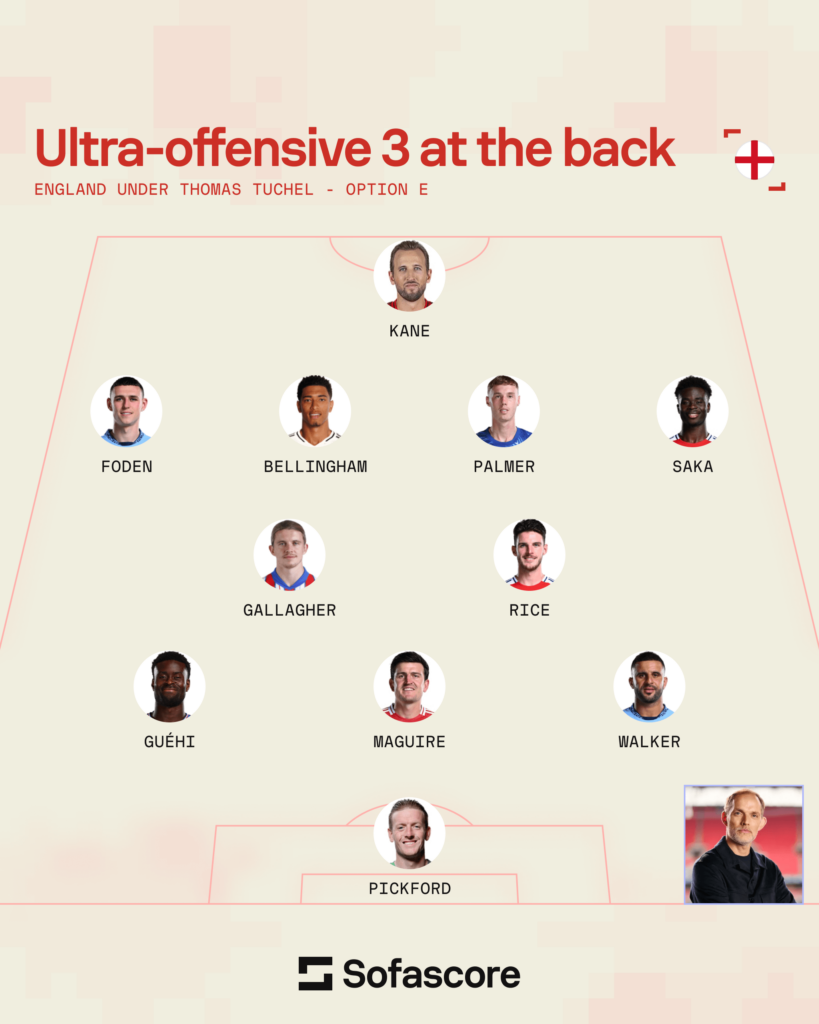
Even though Tuchel hasn’t used this shape too often in his career, it might be an approach he could consider when facing weaker opposition that sets up in a low block ready to defend for 90 minutes. It keeps the solidity of a 3-2 rest defence with two hard working pivots, but it goes all-out attack at the same time with 5 offensive players. Again, the potential link between Palmer and Saka could be enough to wreak havoc against any opponent out there.
Conclusion
There are a few jobs as attractive and important as being the manager of the English men’s national football teams. A role big enough to attract the game’s greatest names and a challenge unlike any other – bringing football home. Over the years, speculation arose surrounding the names like José Mourinho, and lately even Pep Guardiola who has himself admitted of dreaming of taking over a national team and managing at a World Cup. Elsewhere, Brazil has been in contact with Carlo Ancelotti regarding his position as the new boss of the Seleção.
So, the fact that England have gone with such a high-profile name should come as no surprise. Reports suggest that they were looking in their own yard as well, with Graham Potter and Eddie Howe being mentioned as the leading candidates.
With such a big role and so few games to make it or break it, every decision is a gamble in its own right. The FA’s decision to appoint not only a foreign manager, but a manager from Germany, their historical international rival, surely sparked a lot of controversy. The footballing side tells us it’s a pretty sensible decision and that it could actually work out pretty well. But the beauty of this game lies in the fact that nothing is ever as it seems and the only remedy is to let the time do its job and unfold the story.
